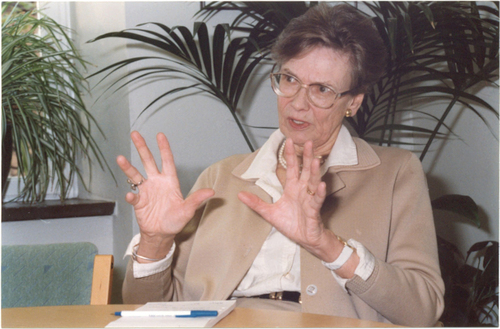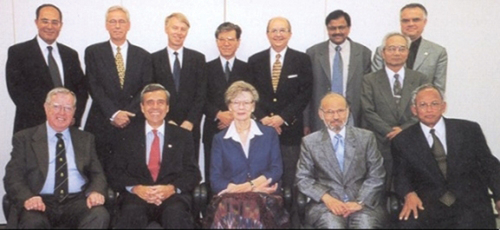Malin Falkenmark, an extraordinary thinker and water scientist, died on 3 December 2023, at the age of 98.
I first met Malin Falkenmark, in 1976, when she was the Executive Secretary of the National Committee for UNESCO’s International Hydrological Decade, a programme that was housed in the Natural Science Research Council, in Stockholm. I was then a Director at the Canadian Environment Ministry, in Ottawa. We were very much aware of each other’s work, but we had not met earlier. The occasion was a focused meeting on the social and ecological aspects of water management. This meeting was organized by Prof. Carl Widstrand, the founding Director of the Scandinavian Institute for African Studies.
What was most impressive during our first meeting was Malin’s approach to work; all her statements were based only on facts and evidence. She was a prolific reader and an excellent conceptualizer. She consistently asked sharp and relevant questions and stayed focused on the main issues that were under discussion. I went back to Ottawa thinking Malin was a person with whom I could do ‘business with’ over a long-term basis.
It was my good fortune that we remained good friends, with regular communication and interactions, for the next 50 years. In fact, our professional lives remained intertwined since our first meeting.
In 1976 Kurt Waldheim, the then Secretary General of the United Nations, appointed Yahia Abdel Mageed, Minister of Irrigation of Sudan, as the Secretary General of the United Nations Water Conference, which was to be held the following year, in Mar del Plata, Argentina. Waldheim, who had absolutely no interest in water, had appointed a Secretary General earlier who neither knew much about water nor had any interest in water. With less than a year to go, Waldheim was forced to replace the first Secretary General of the Water Conference since it was evident the Conference was shaping up to be a great fiasco.
I was then a Senior Scientific Advisor to Dr Mustafa Tolba, Executive Director of the United Nations Environment Programme (UNEP) in Nairobi. Mageed came to Nairobi to discuss with Dr Tolba the organizational process of the Mar del Plata Conference and also to solicit his support for this Conference, both intellectual and financial. I was in Nairobi then, on an advisory visit to UNEP. Dr Tolba invited me to have lunch with him and Mageed. At the end of this lunch, Mageed requested me to be his Senior Scientific Advisor and help him navigate the complex process of organizing a UN megaconference.
Malin played an important role in this Conference. She was unanimously elected to be the Rapporteur General. I worked closely with her, which cemented our friendship even further.
During the 1980s and 1990s, Malin and I were active members of the International Water Resources Association (IWRA). Both were elected Vice Presidents of IWRA during the 1980s. In 1988, I was approached to see if I would like to be a candidate for the IWRA Presidency. My reaction was that perhaps Malin would be a more appropriate candidate since she was some 15 years senior than me. I thus approached Malin to ask if she would be a candidate instead of me. Malin’s response was she had too many commitments which would not allow her to do all the tasks of being an IWRA President. However, she strongly encouraged me to be a candidate.
In fact, one of my first activities as the IWRA President was to appoint Malin as the Chair of a Task Force on Water Strategies for the 21st century. Among the members were Abdel Mageed and Luis da Cunha of Portugal. Within a very short time, Malin prepared an ambitious programme which she carried out with great success during the next three years.
In 1990, another event brought us together again. The city of Stockholm and the Stockholm Chamber of Commerce became concerned that, during the summer, Stockholm was rather empty. Most Swedes had moved to their lakeside homes or gone abroad for summer holidays. Thus, a task force was appointed to recommend what steps could be taken so that stores and hotels could have more customers, load factors of SAS flights would be higher and in general more economic activities would occur during this slow season. The recommendation of this task force included a week-long Stockholm Water Festival every summer. In order to give the festival some gravitas, a Stockholm Water Symposium was proposed during the same week when a new Stockholm Water Prize would be awarded. The city was responsible for the Stockholm Water Festival. However, to organize the Stockholm Water Symposium, the mayor of Stockholm requested help from Malin and Sven-Erik Skogsfors, who was then head of the Stockholm water utility, Stockholm Vatten.
Malin and Sven-Erik promptly reached out to me and invited me to be a member of the Scientific Programme Committee which would organize such a regular annual event. Malin would chair the committee. Her ideas for the symposium were excellent. The symposium would be multidisciplinary and multisectoral and would discuss multi-issues associated with water. The symposium should be a premier global event where leading international experts would discuss cutting-edge water issues and solutions.
After a few years, for various reasons, primarily economic and social, the Stockholm Water Festival became non-viable and was discontinued. However, the symposium went from strength to strength and fulfilled the expectations of the city by significantly increasing its economic activities.
In addition, during the early years of the symposium, Malin, Sven-Erik and I met with the mayor of Stockholm for a series of discussions during which the idea of the Stockholm International Water Institute (SIWI) was born. Sven-Erik was a major force in making SIWI legally possible and Malin became its main scientist. She continued to chair the Scientific Programme Committee of the Stockholm Water Symposium, which later became the Stockholm World Water Week. She resigned as the Chair in 2003 and was succeeded by Jan Lundqvist. From my side, I decided to resign my membership of this committee in 2006, after some 16 years. This was an appropriate time for me to step down since that year I was awarded the Stockholm Water Prize.
In the late 1990s, with the support of the Government of Japan, I founded and chaired the Club of Tokyo. It consisted of 16 of the world’s top water personalities to discuss global water policy issues. Two of the very first members I invited to join the club were Malin and Yahia Abdel Mageed. Their intellectual contributions went a long way to ensure the success of the club.
Malin was a remarkable human being, always kind, courteous and constructive. In my 50 years of work with her, I never saw her angry or exchange sharp words. She was the first hydrologist in Sweden to receive a doctorate. For her lifelong contributions to water sciences, she received both the Volvo Environment Prize and the Blue Planet Prize.
At a purely personal level, I will sorely miss her constructive comments on water-related issues which have had significant impacts on the evolution of my ideas and thoughts.
On Malin’s departure from this earth, I feel the same way as Alfred Lord Tennyson felt when his Cambridge friend Arthur Henry Hallam passed away:
Malin Falkenmark, Requiescat in pace.



